Our One Reliable Source of Truth
“For the Lord gives wisdom; from his mouth come knowledge and understanding” (Proverbs 2:6–CSB).
–pedia (suffix)–that which is related to learning.
Anyone else remember a good ‘ol set of encyclopedias?
As a child, our family had two sets, in fact–a black Collier (circa 1972ish) and a newer set, lest some of the information in the older one had changed over time. I remember the latter being my favorite–with its white and blue binding and gold trim. These World Book Encyclopedias seemed, how to say it, more modern. Thus, I deemed it more accurate, though I know this is silly.
In truth, if one were to open both “D” volumes and compare, for example, the topic “dogs,” he or she would likely discover very similar information. Both were reliable. Both offered truth–not selective, not relative. Just.Plain.Fact.
So when Bill and I married in 1989, it was only natural that we’d want a set of encyclopedias for our own. Even listed it on our “wedding gift list”–an archaic beast that was xeroxed off and passed around, if I’m remembering correctly. (But then, that was a long time ago, and my mind may be recalling this fact incorrectly.)
There was no such thing as an online gift registry. Rather, the happy couple could visit their stores of choice and list in writing what they desired prior to beginning their new life together. (Again, I really can’t recall how all this happened, and I welcome thoughts or recollections on the matter.)
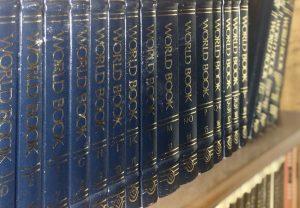
Much to Bill’s and my delight, we did indeed receive a set of encyclopedias. These navy blue, gold-trimmed World Book volumes have adorned our living room bookshelves in several homes over our nearly 32-years of marriage. To crack their covers today, one would find them practically untouched. No dog-eared pages. No highlighted lines. No mars from general use. Because, in honesty, they’ve been used very little.
Even when we homeschooled our sons, these books remained virtually (pun intended) untouched on our library shelf. By this time, any curious mind seeking knowledge simply typed in a topic on his or her web browser and–Voila!–a wealth of information instantly popped up. If one was to personify her set of encyclopedias (not that I’ve ever done that), ours would have been and continue to be very, very lonely.
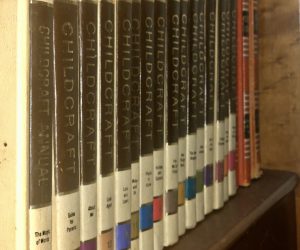
Indeed, our aging set sits alone, its only friend a set of even older Childcraft topical encyclopedias that I’ve had since I was in elementary school. Unlike the World Books, however, several of these I faithfully read as a girl of seven, especially Volume 1–a cover-to-cover book filled with poems and rhymes. It was this particular one, in fact, that first introduced me to the form of poetry I love the most–the haiku…
Of which I’ve written…
But that’s another story,
One you can read HERE!
(See what I did there?)
Needless to say, I’ve considered selling our encyclopedias online, because that, too, is now a thing, or donating them to a local school, but I’m not sure any would actually want them. While libraries and classrooms did, at one time, have at least one set, I’ve learned many no longer do, as they are as old-school as card catalogs. (What’s that? one might ask. Well, you can read about it HERE!)
And why would I even consider getting rid of such a treasure trove of knowledge?
Well, while it’s true that many of the facts contained between the covers of each volume of our World Book Encyclopedias are accurate, no one ever reads them anymore. It’s faster (and easier) to google “breeds of dogs,” for example, and read on the computer rather than remove the chunky “D” book from the shelf, locate the word dog alphabetically, specifically sandwiched between Doenitz, Karl (I have no idea who he is, but I could certainly find him in Wikipedia) and Dogfish. (Again, what in the world?) Once located, the topic dog fills a whopping nineteen pages of this particular book, including glossy photographs of various breeds, as well as diagrams of canine anatomy.
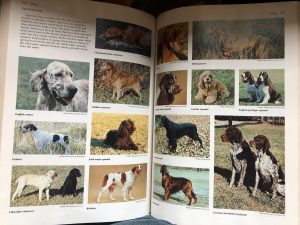
In truth, it’s so much faster to simply do a web search and scan the digital screen. After all, this better suits our fast-paced society, so expectant of quick answers and prone to despise delayed gratification.
One must be careful, however. Even though we’d been warned many years ago that the aforementioned Wikipedia wasn’t always reliable, truthful or accurate but, at times, relative and biased in its information, we still used it a lot throughout our sons’ homeschool years. Our daughter Allie, too, has used it for research, as have Bill and I. But recently we watched an interview with one of Wikipedia’s co-founders, a man called Larry Sanger. He stated–
“Wikipedia allows anonymous contribution… What results are basically establishment views… they’ve completely abandoned the neutral point of view…” (Fox News, Larry Sanger–click here for the interview).
And this is scary stuff.
In order to not be biased myself, I googled other sources to confirm this truth, only to discover related articles in The Washington Times, the New York Post, and in Daily Mail, to name three. All state similarly Sanger’s warning–
Wikipedia should not be trusted as an accurate, unbiased source of information.
And this, coming from one of Wikipedia’s founders. Makes one wonder just where she can turn for reliable, accurate information, which reminds me of something I’ve heard before.
For the word of God is living and effective and sharper than any double-edged sword, penetrating as far as the separation of soul and spirit, joints and marrow. It is able to judge the thoughts and intentions of the heart (Hebrews 4:12–CSB).
While one can’t fully judge the thoughts and intentions of Larry Sanger or others involved in Wikipedia’s founding, nor fully know the intentions of all those who’ve anonymously or otherwise contributed to Wikipedia’s data-base, this passage straight from scripture reminds readers that God’s Word, the Bible, is living and effective. Unlike other imperfect sources related to learning–pedias–the writer of Proverbs promises that–
“…the Lord gives wisdom; from his mouth come knowledge and understanding” (~~Solomon~~).
And that truth brings assurance. Though we’re unlikely to find much between Genesis and Revelation that specifically speaks to, let’s say, dogs, we can trust the One who first created these beloved creatures. Furthermore, it’s not beyond the realm of possibility that Jesus, having been a child who grew to be a man, may have had a dog. I’d like to imagine so anyway.
For now, I think I’ll keep my set of World Book Encyclopedias as a source of more accurate information, even if research takes longer and some things perhaps have changed. Why, maybe I’ll even brush up on random bits of knowledge just to spite opponents in a game of Trivia Pursuit. (Remember that nearly vintage game?)
Mostly, we’d be good to hold to truth found in the one and only reliable source, the Bible. In its 66 books divinely inspired by God and given to at least 40 authors to pen over a span of 1500 years we can read about the One who Himself is…
The Truth (~~Jesus~~)
So, whether or not I crack the covers of my World Book Encyclopedias, though I may wane in my use of Wikipedia, I believe firmly this truth–
“… the Word of the Lord endures forever...” (I Peter 1:25–NIV).
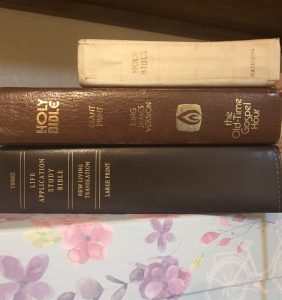
Where do you turn for wisdom? What’s your favorite passage from the Bible, and how has it helped guide your life? Remember–God’s Word is a lamp to our feet, a light to our path (Ps. 119:105).
Dear Jesus, You are The Way, The Truth, and The Life. Please give us Your wisdom as we wander through this crazy world, where we often feel bombarded with information and feel confused about what is true or false. Help us be discerning and wise. Amen.
Tags In
Related Posts
2 Comments
Comments are closed.
Search
Subscribe to Blog via Email
Categories
- At Home (173)
- God's Word (180)
- His World (198)
- Uncategorized (5)

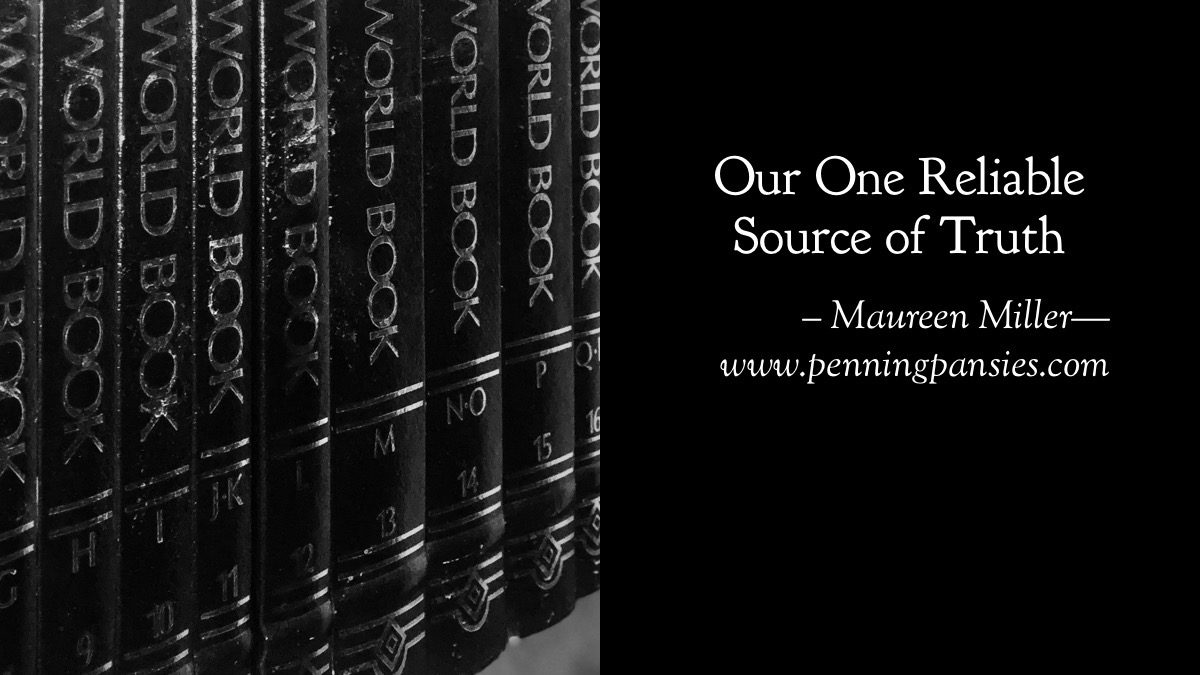

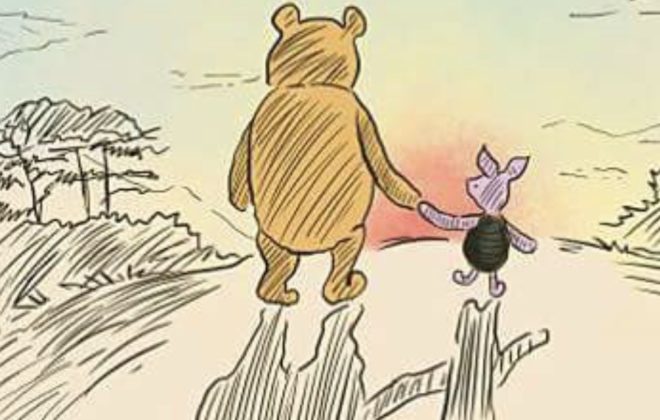

Maureen, I so resonate with your post. I loved our set of Encyclopedia Britannicas when I was a kid, but despite the proliferation of information, it’s harder than ever to establish a baseline of truth. As much as I’m sure I would like Oprah as a person, she has done our culture no favors by encouraging viewers for years to “tell their truth” rather than THE truth.
Now THAT is Truth, dear friend. Amen! Thank you for sharing your thoughts! I say “DITTO!”